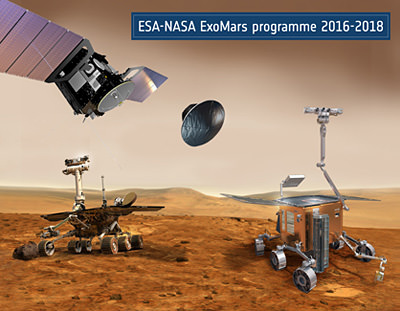[/caption]
After NASA was forced to back out the joint ExoMars mission with the European Space Agency due to budget constraints, ESA went looking for help with the planned multi-vehicle Mars mission. Now, reportedly the Head of Roscosmos Vladimir Popovkin met with Director General of the ESA, Jean-Jacques Dordain last week, and the two signed a memorandum of understanding to work together to make ExoMars a reality.
"The sides consider this project feasible and promising," Popovkin's spokeswoman Anna Vedishcheva was quoted in
Ria Novosti
. "The sides are to sign the deal by year-end."
Russia's participation in the project was also approved by the space council of the Russian Academy of Sciences.
The ExoMars program was slated to send an orbiter to Mars in 2016 and a rover in 2018, but after NASA pulled out of its part of the bargain -- of providing several science instruments and an Atlas launch vehicle – ESA knew they could not do the entire mission on their own. Last fall, when it was becoming apparent that NASA's ability to participate was in jeopardy, Dordain extended an invitation to Russia, and in turn Roscosmos officials hinted they might be interested in joining, offering to provide the use of their Proton rockets for the launches. The two space agencies then had preliminary talks at the Ariane 5 launch at Kourou, French Guiana in March, 2012.
Russian space agency chief Vladimir Popovkin said that Russia's financing of ExoMars could be partially covered by insurance payments of 1.2 billion rubles (about $40.7 million) for the lost Phobos-Grunt sample return mission that would have gone to the Martian moon Phobos.
[caption id="attachment_88262" align="aligncenter" width="580" caption="Artist concept of the ExoMars/Trace Gas Orbiter mission. Credit: NASA"]
[/caption]
The details of the new ExoMars partnership are yet to be worked out, but the ESA/NASA partnership would have sent the Trace Gas Orbiter to the Red Planet in 2016 to search for atmospheric methane -- a potential signature for microbial life – as well as an advanced astrobiology rover to drill into the surface in 2018, with the hopes of determining if life ever evolved on Mars.
Unsurprisingly, the potential deal with Russia comes as a huge relief to European space scientists who have spent years working on ExoMars. Journalist
Paul Sutherland quoted
UK scientist John Zarnecki of the Open University, as saying, "It looks like the cavalry has come riding over the horizon to save us, but this time they are dressed in Russian uniforms. There will be a lot scientists in universities and research institutes throughout Europe who will be very relieved to hear this news. Otherwise it seemed that several years work preparing instruments for this mission was going to go down the drain."
Sources:
Sen.com
,
Ria Novosti
 Universe Today
Universe Today
